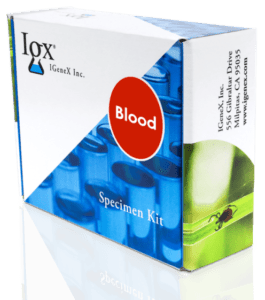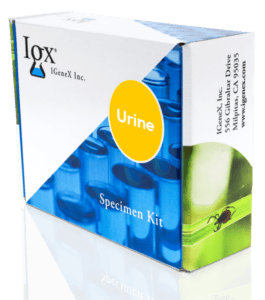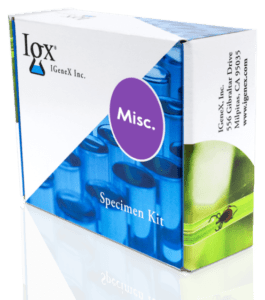• Inexpensive
• An option for initial screening. However, ImmunoBlots and Western Blots are highly recommended in conjunction with these tests.
Test
Lyme Serology IgG/IgM
$95.00
The IgG/IgM Antibody Serology test is an ELISA (enzyme linked immunoassay), which indicates the presence of both IgG and IgM antibodies to B. burgdorferi. Unlike IgM antibodies, which are present shortly after infection takes place, IgG antibodies often persist long after symptoms have disappeared. The presence of antibodies indicate exposure to Lyme-causing Borrelia, not active disease. A positive or equivocal test must be confirmed by both IgG and IgM ImmunoBlots.
This test is recommended at least four weeks after exposure. Patients with the diagnosis of Lyme disease based on clinical history have positive IgG/IgM serology results within one year of the tick bite, approximately 70% of the time. The percentage of patients with a positive serology is reduced in subsequent years.
Tube / Specimen Requirements
1 SST/ minimum volume 0.5mL serum
CPT Code(s)
86618
Sample Report
View
Serology
Available in New YorkYes
Positive: ≥ 1.2
Equivocal: ≥ 1.0 to < 1.2
Negative: < 1.0
- Not generally recommended as a standalone test.
- This test should only be performed in conjunction with Western Blots/ immunoBlots.
- Cross Reacting Antibodies:
-Sera from patients with other pathogenic spirochetal diseases such as syphilis, yaws, pinta, leptospirosis, and relapsing fever may give false positive results.
-Sera from patients with mononucleosis or lupus erythomatosis (LE) may also give false positive results.
-In cases where false positive results occur, clinical epidemiological and laboratory workups should be carried out. Active syphilis and Lyme disease can be differentiated by the use of VDRL or RPR tests. In active syphilis, the VDRL and RPR are positive, whereas in Lyme disease they are not. - Antibiotic therapy given early in the disease may prevent the development of an antibody response. Negative results early in the disease have a low predictive value. Retesting may be warranted if symptoms consistent with Lyme disease persist.
- The evaluation must include review of all test results, the clinical history presented by the patient, the patient’s exposure to endemic regions for Lyme disease, epidemiological data, and potential exposure to other spirochetal diseases.
- The use of this assay has not been evaluated for individuals who have received a Lyme disease vaccine.
Related Tests
GET STARTED TODAY!
The first step in getting tested with IGeneX is to order a collection kit. Choose between a Blood, Urine, or Miscellaneous kit.
WHY IGENEX FOR TICK-BORNE DISEASE TESTING?

- CLIA certified in all 50 states
- Long track record of success since 1991
- Offers testing that is nearly twice as accurate as CDC recommended tests
- Tests for all major tick-borne illnesses, including Lyme disease, TBRF, Babesia, Bartonella, and Rickettsia
- Utilizes comprehensive testing methods such as PCR, ImmunoBlots, IgXSpot and FISH
- Has become a nationwide leader in COVID-19 testing due to a relentless focus on customer satisfaction








